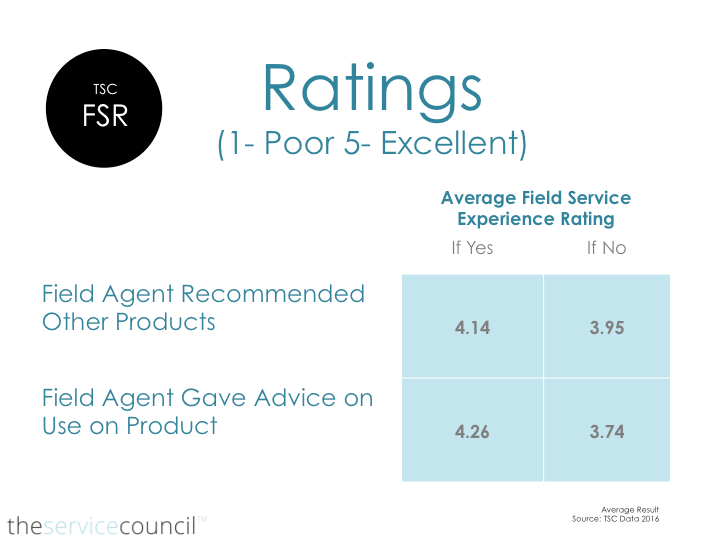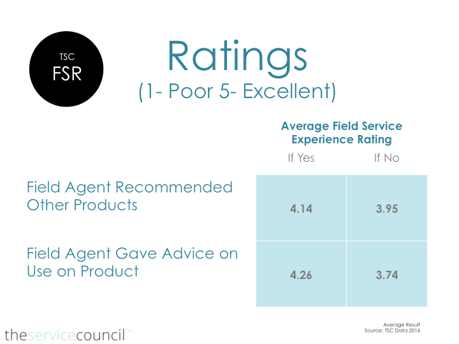Understanding Mobile Field Service Management
As the field service industry is shaped by new trends and technologies, it’s critical that field service organizations are attentive, agile, and...
3 min read
 ServicePower
:
June 23, 2016
ServicePower
:
June 23, 2016

Note: This is the 2nd of our 3-part blog series on consumer perceptions of field service delivery. An introduction to the topic is found in Blog 1 – Field Service Performance: What Resonates with US Consumers.
There is an ongoing debate in service leadership circles on the need for and appropriateness of field service agents selling at the point-of-service. Well, the debate has progressed from to sell or not to sell, to sell or to recommend. Most organizations we poll are driving some form of technician lead program wherein their field service agents are:
recommend solutions to customers with the hope of improving customer satisfaction and uncovering new revenue streams.
When we polled field service agents regarding the pressure to sell, 39% indicated that they were satisfied with the sales push from their organizations (18% were negative, 43% were neutral or had no pressure). Field service agents don't want to be salespeople, yet they see the opportunity in improving customer relationships by recommending tools and services that might benefit the customer. A well-thought out incentive and opportunity management structure also helps get field service agents on board.
What do Customers Think?
Most U.S consumers are open to their field service agents recommending solutions at the time of service. In fact a good percentage were willing to act on those recommendations.
Sixty-five percent of the 650 consumers polled by The Service Council indicated that their field service agents had given them advice on getting the most out of their purchase/product. That's a good start, but a missed opportunity for the remaining 35% to maximize the impact of the field visit.
When it came to field recommendations, 58% indicated that their field agents had recommended additional products and services for use. Of those 58%, 9 out of 10 were positive in terms of their reaction to the made recommendation. Specifically:
Of those to whom a recommendation wasn't made, i.e. 42% of the sample, 8 out of 10 individuals indicated they would have trusted the recommendation made by their field service agents.
There is still a group that doesn't want to be sold to in the field (10% of the group that received recommendations, 20% of the group that didn't receive recommendations), but this group is diminishing. Most consumers expect a recommendation and are willing to listen if the intent is to enhance value. The value of the recommendation also depends on the context of the situation. In the case of an unsuccessful field visit, consumers are less likely to be favorable towards recommendations, as one would expect. The favorability towards a recommendation drops to 50%, as in only one half of the population reacted positively to recommendations or would react positively to recommendations that were made. It’s surprising to me that recommendations are made at all in the case of a ineffective and incomplete service visit.
Looking at it from a different perspective, the consumer ratings regarding on-site field service experience were not negatively affected by the field service agents’ action to recommend solutions. In fact, we found the opposite to true. The activity of advising customers on the use of the installed, delivered, or repaired product had a significant positive impact on the consumer’s overall field service experience.

Poor Mobile Engagement
What was also staggering is that less then 30% of consumers polled stated that they saw their field service agents use their mobile device for work-oriented tasks or to deliver a better experience. Only 27% stated that they were asked to sign on a mobile device for service work completed. Less than 20% had their field service agents overview information on the device, indicate support resources, or print supporting information with the aid of mobile tools. This is very interesting given a large percentage of organizations are using mobile devices and applications for field service. It points to:
This presents a significant opportunity for improvement. Upon completion of a service task, a field service agent should be able to leverage mobility to further engage the customer particularly as it relates to:
This is just a start, but mobile can be used to showcase the intent for a broader relationship with the customer as opposed to delivering a message where the customer is one of many transactions to be completed in the field service agent’s day.
We conclude our field service consumer series with a post early next week. Please feel free to join our summary webinar on June 30, 2016 at 1030am Eastern.
Once again, feel free to send in any questions directly to sd@servicecouncil.com.

As the field service industry is shaped by new trends and technologies, it’s critical that field service organizations are attentive, agile, and...

The field service industry is ripe with opportunities to optimize efficiency and service delivery. Failure to identify deficiencies can lead to...

Unlike a comfy office job, field service technicians face dangers and hazards on the job all the time. The work they do is so important, but...